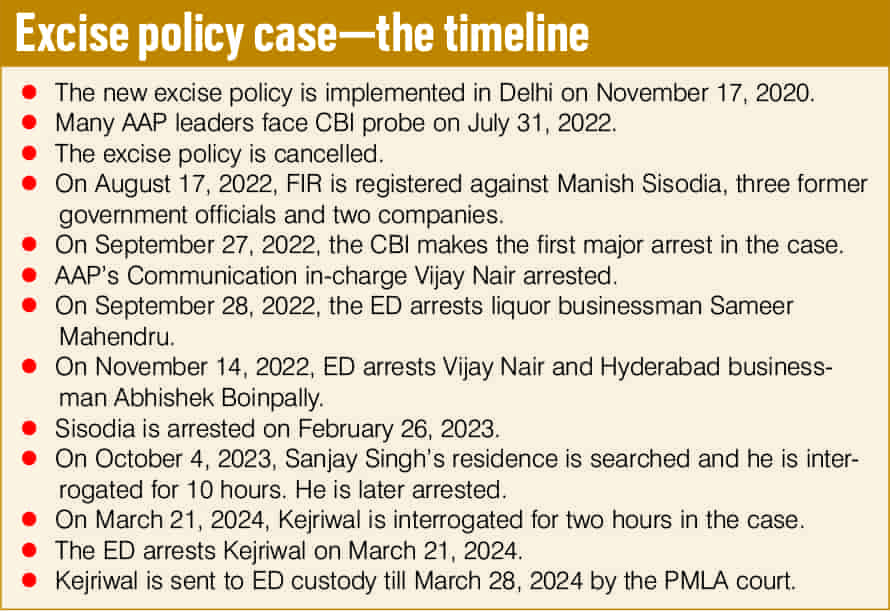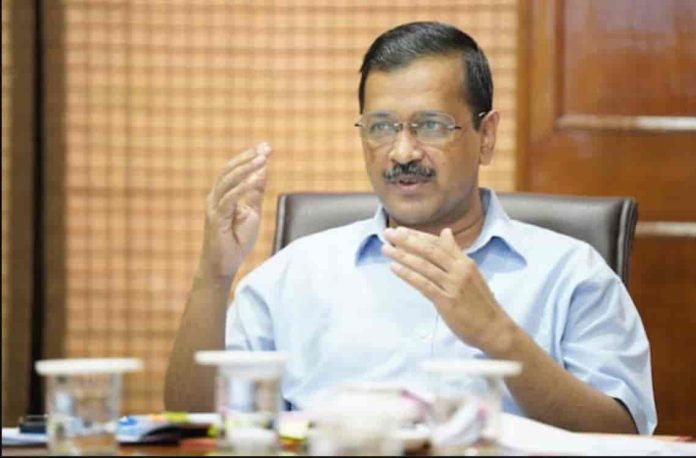As the Delhi chief minister is sent to six-day ED custody in the case, questions are being raised on the politics behind the arrest and its pre-poll timing. He is the first sitting chief minister to be arrested by any agency in the country
By Sanjay Raman Sinha
In a surprise late evening swoop on March 21, the Enforcement Directorate (ED) initiated search operations at the residence of Delhi Chief Minister Arvind Kejriwal. After a two-hour search and preliminary questioning, the agency apprehended Kejriwal and kept him overnight at the office cell and produced him at the PMLA court the next day on March 22 where he was remanded to ED’s custody for six days till March 28.
The arrest was over Delhi excise policy-linked alleged scam in which money laundering charges have been slapped on Aam Aadmi Party (AAP) leaders. The ED operation was dovetailed to the Delhi High Court order in which interim relief from arrest was denied to Kejriwal. The ED team had arrived armed with the tenth summon, after the earlier nine were not complied with by Kejriwal. With Kejriwal’s arrest, the four main leaders of the AAP are now behind bars. The late evening arrest saw a melee of AAP leaders, who had gathered outside Kejriwal’s official residence, protesting. The agitating party workers were bundled in police vans and taken to police stations. Section 144 was clamped in the area.
The political reaction was strong and rose in intensity as time went by. Rahul Gandhi was the first to lash out online. He posted on X: “A scared dictator wants to create a dead democracy”. Later on, the West Bengal chief minister also slammed the Modi government over the arrest. Mamata Banerjee wrote on X: “It’s outrageous that while elected opposition chief ministers are being deliberately targeted and arrested while individuals accused under CBI/ED investigations are allowed to continue their malpractices with impunity, especially after aligning with the BJP. This is a blatant assault on democracy.” Other political heavyweights also joined the chorus and condemned the arrest.

Immediately after the arrest, the AAP tried to move the Supreme Court for an urgent hearing. The case was to be mentioned before Chief Justice of India (CJI) DY Chandrachud. But, the CJI asked the lawyers of both the parties involved in the case to appear before the special bench of the Court. A special bench, comprising Justices Sanjiv Khanna, MM Sundresh and Bela Trivedi, was supposed to hear Kejriwal’s plea challenging his arrest by the ED. An application against Kejriwal’s arrest had already been filed in the Supreme Court seeking relief under Article 32. The ED had also filed a caveat in the Supreme Court. The central agency appealed that a decision should not be given without hearing its side.
Justice Khanna told Abhishek Manu Singhvi, who appeared on behalf of Kejriwal, that his petition would be heard by a special bench of three judges because it is the bench of three judges which is hearing the case related to ED. It is noteworthy that the case related to PMLA Act is before the bench of these three judges.
However, later on March 22, Kejriwal withdrew his plea against arrest by the ED from the Supreme Court, saying that the petition in the Court is clashing with the remand hearing at the PMLA court. As Singhvi was supposed to argue the case at the PMLA court, it is believed that the whole idea was to avoid a clash.
Meanwhile in a related development, K Kavitha, Bharat Rashtra Samithi (BRS) leader and daughter of former Telangana Chief Minister K Chandrasekhar Rao, who was arrested allegedly for being part of the “South Group” was denied bail by the Supreme Court. A special bench of Justices Sanjiv Khanna, MM Sundresh and Bela M Trivedi ruled that Kavitha has to go to the lower court to apply for bail. Incidentally, this is the same bench which was supposed to hear Kejriwal’s plea in the Supreme Court.
The arguments at the PMLA court were fiery. The ED asked for a ten-day remand which was strongly opposed by Kejriwal’s side. In its remand application, the ED alleged that Kejriwal is the mastermind and main conspirator of the scam. It held that he is directly involved in conspiring and preparing the Delhi Excise Policy 2021-22 to benefit some persons and also involved in demanding a bribe from liquor traders in return. The ED claimed that Kejriwal is involved in using the proceeds of crime for Goa elections. The ED in its application also said that this policy was made in connivance with Vijay Nair, Manish Sisodia and members and other representatives of South Group, keeping in mind the benefits given to the Group.
It was also contented that Kavitha’s CA Buchi Babu revealed in his statement that Arun Pillai was working with Vijay Nair in making the liquor policy and he was working for the provisions in the policy as per Kavitha. Vijay Nair was working as a link for Kejriwal and Sisodia. According to the ED application, Sisodia’s secretary C Arvind said in his statement that in March 2021, Sisodia called Arvind to Kejriwal’s house where Satyendar Jain was also present. There Sisodia gave him a 30-page draft and said that the final GOM report has to be prepared on it. At that time, Jain and Kejriwal were also present there. The ED also said that there is a history of destruction of electronic evidence in this case. A large number of phones have been destroyed. The ED further argued that Kejriwal has to be confronted, money trail has to be recovered, and that this is a fit case for giving remand.
On the other hand, Singhvi contended that the ED is continuously resorting to the same three-four names and its entire remand application is a copy paste of the arrest note. The basis of arrest is the statement of state-turned approvers. Singhvi contended that this is the new method of ED—first arrest them and then make them government witnesses and take the desired statements.
After hearing the arguments from both the sides, the court sent Kejriwal to ED custody till March 28. Before appearing at the court, the Delhi chief minister said: “Whether I stay in jail, or outside, my life will be dedicated to serving the nation.”
The Kejriwal case brings to the fore again the shortcomings of the money laundering law which converts bail plea into a mini trial with odds heavily stacked against the accused. A prima facie case on the basis of prosecution charge-sheet can demolish every chance of getting bail. The bail jurisprudence is reversed in PMLA—the accused is assumed guilty till proven otherwise. This provision has been exploited to the full by the investigating agencies and have made incarceration a rule.
In March, the Supreme Court had observed that delay in trial and prolonged imprisonment makes an accused eligible for bail despite the Section 45 of the Prevention of Money Laundering Act. Interestingly, the petition for review of the Supreme Court’s decision regarding the Act was rejected by the Court. The judgment held that the ED must furnish written grounds of arrest to persons arrested in money laundering cases.
However, despite various verdicts on PMLA, the provisions of the Act stonewall any relief to the accused and infringe upon their fundamental rights, thus raising questions whether the Act is in consonance with the guarantee of natural justice enshrined in the Constitution.


